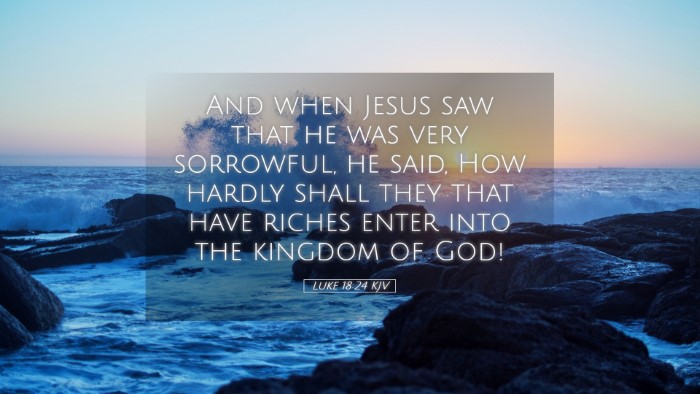Commentary on Luke 18:24
Bible Verse: "And when Jesus saw that he had become very sorrowful, He said, 'How hard it is for those who have riches to enter the kingdom of God!'" (Luke 18:24)
Introduction
The Gospel of Luke presents a significant teaching on wealth and its spiritual implications. This verse forms part of the narrative concerning the rich young ruler, who displayed an earnest concern for eternal life, yet found himself hindered by his possessions. The verse serves as a poignant reminder of the obstacles that material wealth can pose to spiritual growth and salvation.
Analysis of the Text
In this verse, the emotional response of Jesus to the young ruler’s sorrow captures the heart of this teaching. His use of the term "hard" reveals not only the difficulty but also the moral implications associated with wealth in the pursuit of divine truth.
Matthew Henry’s Insights
Matthew Henry elucidates that the sorrow of the young man arose from his inability to part with his wealth. Henry points out that riches have a unique power to ensnare the soul, presenting a formidable barrier to a radical commitment to Christ. He notes that Jesus did not condemn wealth in itself but highlighted the spiritual peril of placing trust in material possessions rather than in God.
Albert Barnes’ Exposition
Albert Barnes emphasizes the rarity of wealthy individuals who fully surrender their reliance on worldly riches to embrace the call of Christ. He interprets "it is easier for a camel to go through the eye of a needle" (which follows in the narrative) as a vivid metaphor illustrating the improbability of the rich finding entrance into God's kingdom while clinging to their possessions. He also posits that the pursuit of wealth can lead to self-deception, causing individuals to believe that their material resources afford them security that supersedes their need for spiritual grace.
Adam Clarke’s Commentary
Adam Clarke provides a theological reflection suggesting that while material wealth can be used for noble purposes, it inherently brings challenges that can easily distract individuals from spiritual truths. Clarke elaborates by discussing the broader context of Jesus's teaching, indicating that the rich young ruler's sorrowful reaction is illustrative of a deeper spiritual conflict. He stresses that true discipleship often necessitates a radical re-examination of one’s priorities and values, encouraging a detachment from materialism in favor of heavenly treasures.
Theological Implications
The teachings encapsulated in Luke 18:24 bring forth critical theological reflections on the nature of discipleship and the heart of the Gospel. Wealth, as represented in this passage, can obscure human recognition of dependence on divine grace. The passage challenges the notions of riches as signs of God's favor and compels a deeper examination of the conditions for entering the kingdom of God.
- Dependence on God: The verse underlines the necessity of relying not on material wealth but on God's provision and grace.
- Radical Discipleship: Jesus calls for an all-or-nothing response to the invitation of discipleship, demanding a willingness to forsake earthly security for spiritual fulfillment.
- Spiritual Barriers: Wealth, while amoral, poses distinct challenges that can lead to spiritual lethargy, arrogance, and complacency.
Pastoral Applications
For pastors and church leaders, this passage offers profound insight into counseling those who struggle with the allure of wealth. It invites a pastoral approach that recognizes the challenges wealth may pose to spiritual maturity, urging congregants to engage in self-reflection and evaluation of their priorities. Sermons and teachings based on this text can emphasize the importance of generosity, community support, and the spiritual discipline of detachment from material possessions.
Conclusion
Luke 18:24 serves as a clarion call to evaluate the position of wealth in our lives and its impact on our relationship with God. Through the combined insights of Matthew Henry, Albert Barnes, and Adam Clarke, we arrive at a richer understanding of Jesus's teaching. This verse invites us into a deeper conversation around faith, discipleship, and the hard truths regarding wealth and salvation. Ultimately, it reminds believers that while the pursuit of wealth is commonplace, the pursuit of God’s kingdom demands radical devotion and sacrifice.


